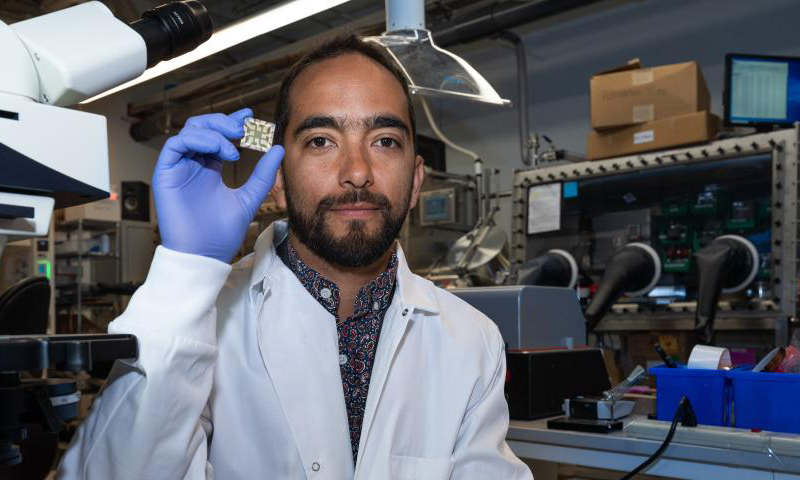IMat Initiative Lead Q&A: Juan-Pablo Correa-Baena
Nov 03, 2023 — Atlanta, GA

Juan-Pablo Correa-Baena leads the Materials for Solar Energy Harvesting and Conversion research initiative for the Institute for Materials (IMat) and Strategic Energy Institute at Georgia Tech. In this role, he is working to create a community around solar energy harvesting and conversion at Georgia Tech. He aims to integrate photovoltaic, photodetectors, and related devices into IMaT-related research; energize research in these areas at Georgia Tech at large; and consolidate the expertise of the many research groups working on or around photovoltaics/photodetectors that will allow researchers to target interdisciplinary research funding opportunities. He is also an assistant professor and the Goizueta Junior Faculty Rotating Chair in the School of Materials Science and Engineering.
In this brief Q&A, Correa-Baena discusses his research focus, how it relates to materials research, and the impact of this initiative.
What is your field of expertise and at what point in your life did you first become interested in this area?
I am an expert in materials for energy harvesting and conversion. I first became interested in this topic when I was an undergraduate student and started thinking about the future of energy production.
What questions or challenges sparked your current materials research?
I was born and raised in a country where fossil fuels dominate the energy production landscape, yet where renewables are readily available. Colombia is a large producer of oil but also boasts a huge potential for solar energy production. This juxtaposition always puzzled me growing up. As a researcher in this field, I want to ensure that all countries around the world have access to solar energy, by helping lower deployment cost.
Why is your initiative important to the development of Georgia Tech’s Materials research strategy?
There is a growing need to expand our research footprint at Georgia Tech with regard to photovoltaics. This is especially important with the impact of the photovoltaic industry presence in Georgia. My initiative is focusing on galvanizing activities around photovoltaic research at Georgia Tech that can benefit our footprint globally as well as locally with industry partners.
What are the broader global and social benefits of the research you and your team conduct?
The main benefit of the research we do is to the photovoltaic industry, which we hope to engage through cutting-edge research at Georgia Tech.
What are your plans for engaging a wider Georgia Tech faculty pool with IMat research?
I am planning to organize an internal workshop, as well as a session on photovoltaics in the Next Generation of Energy Materials Symposium to be held in March 2024 at Georgia Tech. In addition, as part of my efforts to engage the Georgia Tech community at large, I am working to create a website that will connect the Georgia Tech community working towards advancing photovoltaic capabilities for future manufacturing advancements.





